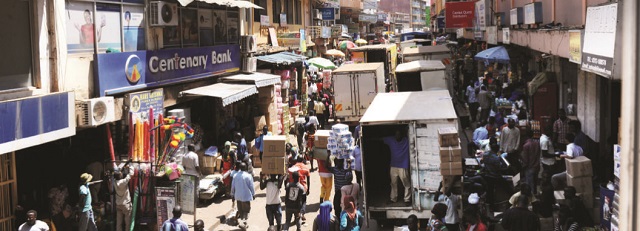
Indians kicked out
But right next to them, a group of locals is playing a board game; Ludo, in front of another shop that Kabaale says has closed recently.
“This shop belonged to Indians, but they have left,” Kabaale says, “I won’t be surprised if it opens and it’s the Chinese running it.”
Kabaale shows us a few more shops that he says used to be run by `Indians’ – which means all Asians- and are now operated by Chinese. According to him, it is not only locals burning out under the fire of the red dragon; Indian traders, once considered the smartest retail operators, are being pushed out too.
This is a major break from the past since Indians have dominated trade in Uganda since 1903 when Allidina Visram, an Indian also known as the grandfather of trade in Uganda, established the first major shop turning the street along old Kampala into the centre of trade.
Their shops known as Indian Duukas have dotted the Ugandan capital and the small towns across the country. But like this shop in Kikuubo, the Indian Duuka is increasingly being replaced by the Chinese retailer not just in Kampala but across the country. Some of the Indians are joining their kin in manufacturing, another sector they have controlled since Visram days, observers say.
Although most fled when then-President Idi Amin launched an Africanisation of retail trade in 1971, a large number have come in since 1980 when he was ousted.
Only five years ago, Kenya, parts of Europe and Eastern Asia were the major sources of goods for the traders in Uganda. But, since 2000, traders have been shifting to mainly South Eastern Asia and specifically, China.
Today, according to Bank of Uganda (BoU), trade between Uganda and China is valued at $737 million (Shs2.6 trillion) as at end of 2016. Of this, the bulk is imports – $710 million (Shs2.5trillion).
As Chinese goods have become a huge attraction owing to mainly their affordable prices, trade observers say the Chinese have seen an opportunity to expand across the country.
“Apart from the shops here,” Katimbo says, “they have put their agents all over Kampala and its many suburbs.”
Estimates indicate that there are about 50,000 Chinese in the country. These started coming in big numbers in the early 1990s to construct the Mandela National Stadium; the biggest symbol of the Chinese presence in Uganda built with a US$36 million grant from China.
After the stadium was completed in 1997, many stayed around to do other jobs as China shifted focus to construction and maintenance of telecom infrastructure, roads and rail, hospitals and schools, agricultural farms, and lately; hydropower dams and oil. Whenever they set up a project, the Chinese ensure they open a local retail outlet to supply the army of Chinese workers.
One of the biggest Chinese projects currently is the 600MW Karuma hydropower dam. There are an estimated 5000 Chinese at the Karuma construction site and they have a mega supermarket named the ChidaMart.
Mukwano Arcade, a mega-structure, that overlooks Kikuubo, most likely has the biggest Chinese population than anywhere in Kampala.
With over 500 shops, the mammoth complex houses Chinese who operate shops, supermarkets, gaming parlors. They live on the third floor in dormitory-style homes where they sometimes live several in a room.
Away from the shops at the heart of town, the Chinese operate many other supermarkets in Kampala suburbs. Here, they tend to keep a low profile, not mingling much with the locals, and keeping their lips sealed.
Cathy Mugisha once worked for Chinese in Denimax Supermarket in Bukoto, a Kampala suburb. She says she quit over long working hours (8am to 12am) for little pay (Shs160, 000; Approx.US$45 a month).
She says when they first arrive, most Chinese often do not speak English; which is the lingua franca, but they quickly learnt it. Businesswise, she says they buy most of their merchandise from fellow wholesale Chinese dealers in Kikuubo.
But Katimbo says some major Chinese wholesalers position other Chinese in the suburbs outside the capital Kampala to supply Chinese goods as far as they can. A local businessman running a business with a Chinese trader says the chain extends as far back as China, where the Ugandan Chinese get capital, goods, or cash and repay over a long time.
“They keep paying back at low interest,” he says, “they benefit because they now have a business and a job.” He says their funders back in China also benefit in interest on loans.
“But most importantly, they are creating a market; a supply chain for Chinese goods,” he says.
A few more kilometres from Bukoto is another trading centre named Kisaasi. In a building in the heart of the town is a Chinese supermarket.
“They pay rent several months in advance even before the building is done,” a local realtor said, “There is a place where they paid for five years in advance. Not many locals can afford that.”
In Kireka, another Chinese supermarket specialising in furniture is set up right next to a workshop for furniture. A local said it looked like the Chinese proprietors targeted this place because people already knew it for furniture.
 The Independent Uganda: You get the Truth we Pay the Price
The Independent Uganda: You get the Truth we Pay the Price



It’s in every nations interest to protect its citizens. Anyone that has doubts should check what the current US President said; “America first”. Amin did the greatest service to Uganda when he asked the foreigners to leave. It’s the duty of the nation to protect its citizens, and as such, there should be laws that regulate the entry, activities and stay of all foreigners in the country. If a country chooses to put foreigners ahead of it’s own citizens, then there is a problem. And that seems to be the trend right now in UG.